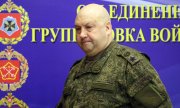Wagner rebellion: top general Surovikin in prison?
The press in the West and all over the world is rife with speculation about how Putin will deal with those within his own ranks who were implicated in the aborted Wagner uprising. The disappearance of General Sergei Surovikin, the deputy commander of the Russian armed forces in Ukraine who according to press reports has been imprisoned on suspicion of complicity is further fueling speculation.
Suspiciously stiff rhetoric
La Stampa finds the presumption of complicity credible:
“When, in the paralysed hours of the Wagner advance on Moscow, General Surovikin was one of the few to appear on video to condemn Yevgeny Prigozhin and call on him to stop, many were struck by his stiff, almost unnatural posture. ... While 'General Armageddon' - as he was dubbed in Syria after the destruction of Aleppo - is not exactly known for his brilliant rhetoric, in the short video he sounded more like a Red Army general from a 1970s James Bond film. ... Some Russian military bloggers commented, only half in jest, that Surovikin - who was notoriously close to the Wagners - had been taken hostage and forced to disown his allies.”
A victim of paranoia
Blaming Surovikin is not particularly convincing, argues Dmitry Kolesov, editor-in-chief of Republic newspaper, in a Telegram post republished by Echo:
“I find it hard to believe that Surovikin could have supported the mutiny. But for one thing, the level of paranoia must be so great now that conspiracies are being sought everywhere. For another, Putin must now demonstratively punish any culprits and try to reinforce discipline. Surovikin, however, is not a very logical choice to be pilloried because, unlike Shoigu, the army likes him. Rather than scoring points for Putin, arresting the general is likely to make the army even angrier.”
Putin only suppresses the weak and defenceless
In a Facebook post, economics professor Konstantin Sonin compares Putin's reaction with that of Hitler after 20 July 1944 - and sees major differences:
“Will Putin now hang some, strangle others in their cells and drive the rest to suicide? My prediction is that he won't, because Putin is a coward and only attacks the weak. Killing the unarmed and unguarded Nemtsov, poisoning Navalny or [publicist Dmitry] Bykov, imprisoning women poets and directors - that he'll do. But Surovikin, [General Vladimir] Alexeyev, those generals who let Wagner enter Rostov and Voronezh and the commanders who remained idle for a whole day - unlikely. ... Only the lower ranks - if anyone - will be put in prison.”
Crackdown difficult in the middle of a war
The aftermath of the Wagner mutiny will only become apparent over time, security expert Rainer Saks writes in Eesti Päevaleht:
“There is no official confirmation of Surovikin's arrest. He is suspected of having, if not participated in the mutiny, at least aided and abetted it. The Russian president made speeches of thanks and awarded medals to the military, but everyone knows the army did nothing to stop Wagner. ... There is no doubt that the Russian president himself understands this best, and purges in the army will surely follow. The problem is the war in Ukraine, which makes it hard for punitive measures to be carried out swiftly.”

